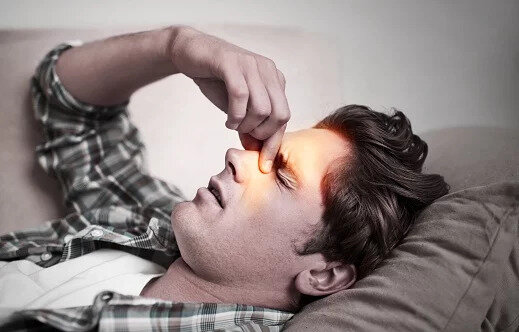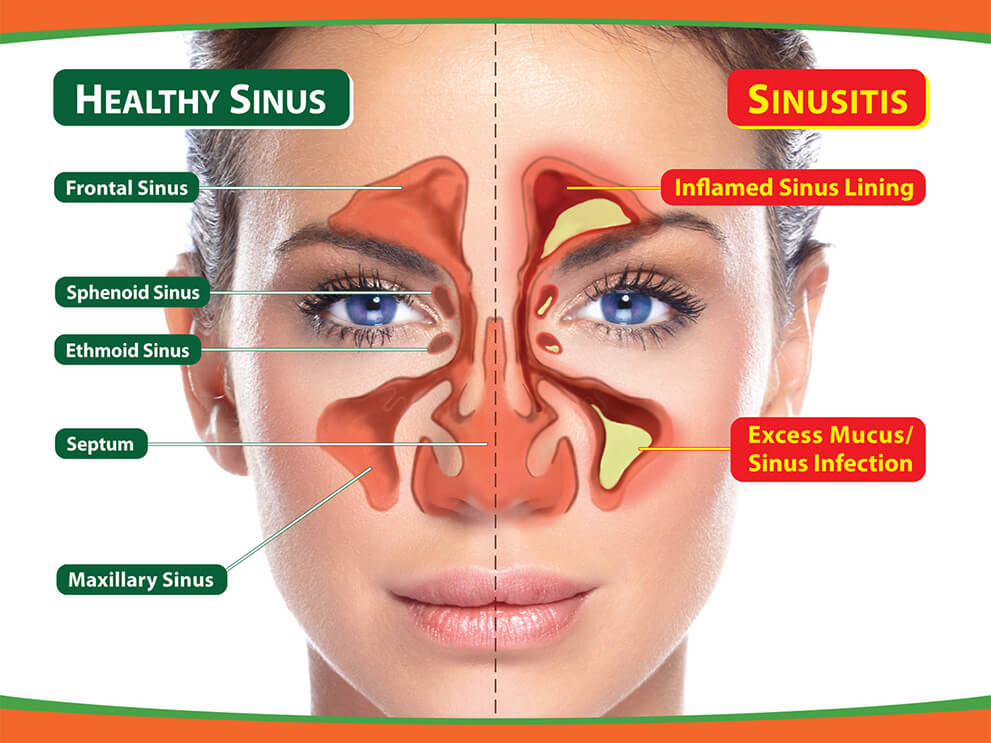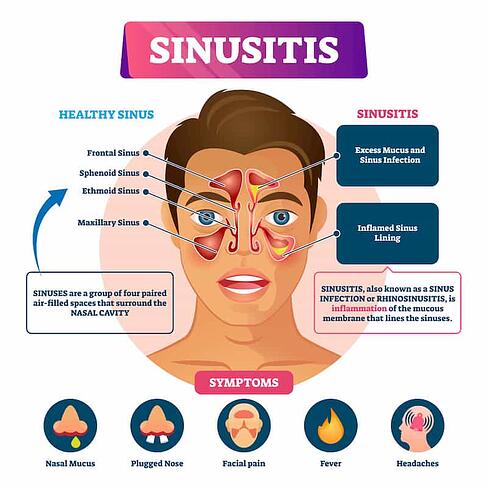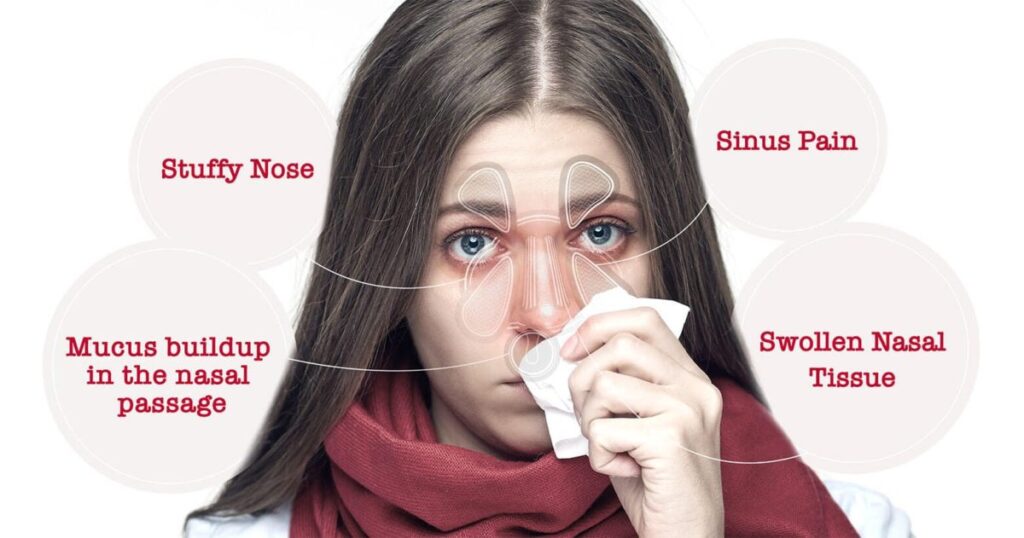CONDITIONS THAT MIGHT AFFECT THE SINUSES
Any cold with headache symptoms can actually be normal. But it could be something very serious, like sinusitis. Sinus is also called ‘sinusitis’. Sinus is one such problem that is causing problems for a large population today.
It is a nasal disease that begins with chills, shortness of breath, and pain in the muscles of the face. In this article, we have listed the causes, symptoms, and home remedies to treat sinus.

WHAT IS SINUSITIS?
Sinusitis is a very common inflammation of the paranasal sinuses, the cavities that produce the mucus needed for the nasal passages to function properly.
A sinus infection can be acute or chronic and can be caused by a virus, bacteria, fungus, allergy, or even an autoimmune reaction. Sinus skull including the bones of the nose, cheeks, and behind the eyes.
Healthy sinuses usually do not contain any bacteria, but when there is inflammation in the sinuses or pneumonia, the mucus accumulates, and germs begin to multiply and cause an infection called a sinus infection.
While it can be uncomfortable and painful, sinusitis often goes away without medical intervention. However, if symptoms last for more than 7 to 10 days, or are accompanied by fever or a worsening headache, you should see your doctor.

TYPES OF SINUS
There are four types of sinuses. Let’s see what types they are, and we’re going to explain them below:
- Acute rhinosinusitis
Acute and acute sinus is of the shortest duration. This sinus infection caused by a viral infection lasts for four or fewer weeks. This acute sinus is also caused by the common pathogens Streptococcus pneumoniae, Moraxella catarrhalis, and Haemophilus influenzae. - Subacute rhinosinusitis
Symptoms of subacute sinusitis can last for a period of 3 months. This condition is usually caused by a bacterial infection or seasonal allergies. - Recurrent acute rhinosinusitis
This is a type of sinus that recurs over time. This can happen four to five times a year. Symptoms are observed each time for 7 days. Because of its frequent occurrence, it is called recurrent. - Chronic sinusitis
Chronic sinus is a long-standing sinus. Its symptoms last for 12 weeks i.e. for about 3 months. It can be caused by allergies, infection, mucus, and inflammation. - Allergic sinusitis
In addition, there is also allergic sinusitis, which is caused by allergies to a person. The best way to treat allergic sinusitis is to avoid the things that cause the allergy.
There are various causes of a sinus infection. Let us discuss the following:
- Allergies
This type of nasal disease can occur mainly in a person who has some kind of allergy. This is why a person should get their allergies tested. It can be caused by polluted air, smoke and dust, and polluted air, perfume, etc. - Weakness of immunity
If you have a weakened immune system, there is a high chance that you may have a higher chance of being exposed to a variety of bacterial and viral infections. - Abnormal nasal structure
Nasal problems can occur when a person has an abnormal nose structure. So when a person goes to the doctor with this problem, the doctor does an X-ray of his nose to find out the structure of his nose, and to prevent nasal infection. The problem may be the nasal bone growing into a pointed shape. - Genes
Sinusitis can also be caused by family history. If someone else in a person’s family has sinus, they are more likely to get this nasal disease. Suppose one of the parents has a sinus infection, the child is more likely to be affected by sinus. - Suffering from migraine
A person suffering from migraine may also have sinus. Therefore, a person suffering from a migraine should get it properly treated by their doctor to avoid any further complications.

SYMPTOMS OF SINUSITIS
When it comes to adults, the symptoms of acute sinusitis can start with a common cold. This cold condition may get worse in 5 to 7 days instead of getting better. Here are some common symptoms in adults:
- Sore throat
- Damage to snails
- Bad breath
- Cough, which gets worse at night
- Feeling tired and sick
- Fever
- Headache
- nasal congestion or running
The symptoms of sinusitis in children are as follows –
- Very high fever
- Nasal congestion or running
- Cold or respiratory illness, which gets better and then gets worse
- A runny nose that lasts at least 3 days
- Cough that has been present for more than 10 days
DIAGNOSIS OF SINUS
There are a few ways to diagnose chronic sinusitis including:
- Imaging test
Images may be taken using a CT or MRI which can show details of your sinuses and nasal area. These can help detect inflammation or physical blockages that are difficult to detect using an endoscope. - Taking a Look at Sinus Cavities
A thin, flexible tube with a fiber-optic light inserted through your nose allows your doctor to see inside your sinuses. - An allergy test
If your doctor suspects that allergies may be triggering your chronic sinusitis, you may be recommended an allergy skin test. A skin test is safe and fast and can help find out what allergen is responsible for your runny nose. - Samples from your nose and sinus discharge
When samples are taken from your nasal cavities they are usually unnecessary to diagnose chronic sinusitis. If the infection fails to treat or continues to worsen, your doctor may swell the inside of your nose to take samples, which can help determine the cause, such as bacteria or fungus.

SINUS TREATMENT
Never take sinus medicine without a doctor’s advice.
- Painkillers
The doctor who treats sinus may prescribe painkillers for acute pain. This medicine can provide relief from headaches and other pains that may be caused by the sinus. - Decongestant
Taking pseudoephedrine orally may be recommended, but this sinus medicine can cause insomnia, anxiety, or nervousness. Also, people with high blood pressure are advised to take this medicine with caution. - Intranasal corticosteroids
Intranasal corticosteroid is a type of spray, which is injected into the nose. It can be helpful in treating chronic, acute, and recurrent sinusitis. - Antibiotics
If the sinus is caused by bacteria, it may be advisable to take antibiotics in the form of sinus medication for 2 weeks. When treating sinus disease, doctors may recommend amoxicillin or co-amoxiclav antibiotics depending on the patient’s condition and allergies to them. - Surgery
Again, sinus disease can also be treated with surgery, but this condition occurs when sinus medication doesn’t work. In more severe situations, the doctor may perform surgery to treat the sinuses. - Yoga for sinus
Yogasana can also be an effective home remedy for sinuses. When you do yoga, special attention is paid to inhalation and exhalation during yoga, due to which the respiratory system gets stronger. - Moisturize Your Sinus Cavities
Take a bowl of moderately warm water, and breathe in the vapors from the bowl by wrapping a towel over your head. Be sure to keep the vapor directed towards your face. You can also take a hot bath in the hot air. It will moisturize your cavities, and give you relief. - Stay hydrated
Drink water every day for at least 4-5 glasses of water to stay hydrated. Hydration is the key to recovery from any bacterial or viral infection. - Take rest
People should try and get as much rest as they can while they have a sinus infection. This will help the body recover and allow it to spend its energy fighting the infection. Staying at home and getting proper rest can also help prevent spreading the infection to other people. - Essential oil
A cold, allergies, a sinus infection, and the flu are common causes of sinus congestion. Certain essential oils, including eucalyptus and peppermint oils, can help open the airways and reduce congestion. Essential oil is a natural remedy. People use them to relieve sinus congestion, unblock stuffy noses and promote sinus drainage. - Prevention of Sinus Infection
A person suffering from this sinus disease wants to know how he can prevent sinus infection. If he gets this information, he can reduce many of its risks and with that, he can recover quickly with its help.
If you or anyone you know is suffering from persistent nasal congestion, runny nose, sore throat and fever, you may have sinusitis.
Call us today on (469) 545-9983 to book an appointment with our expert podiatrists.
